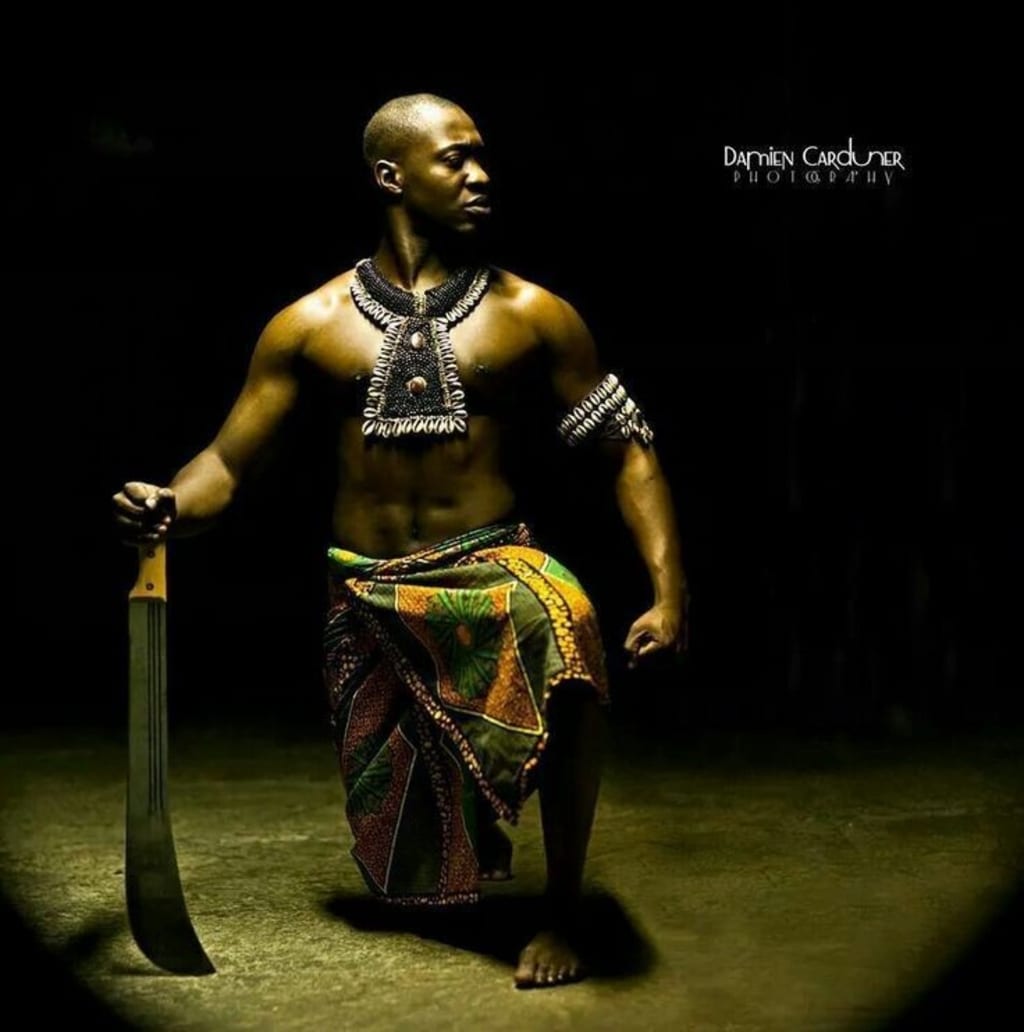Yoruba Orisha Ogun: The God of War
“From sand to silicon and glass, these elements are in the domain of the warrior Ogun. The Study of the art of war is led by Ogun.” – Oxala Aye

Ogun is a Yoruba (African) Orisha God who was a real person who went by the name Alakaaiye from the kingdom of Ife (Yorubaland), and he was an Ife king during medieval Africa. Like King Oduduwa of the Ife Kingdom, King Ogun was also deified by the Yoruba people because he lived a great earthly life. Early Yoruba people cosigned smelting, and the fabrication and the use of iron tools, to the patronage of one of their most senior deities, the god later known as Ogun, who was from earlier times worshiped as the patron god of all working folks of Yorubaland. Ogun may have possibly been the first of such Yoruba gods, hence his situation as “Osinmole” (first, or king, among the earliest spirits or gods). In medieval Yorubaland (present-day Southwest Nigeria, a smaller part of Benin Republic, and still a small part of Togo Republic), the cult of Ogun became a special royal cult, and Ogun became, in addition to being the god of iron, also the god of war – the giver of victory in war.
In the beginning of time, the Yoruba believe the whole surface of the earth was a watery matter, and Olodumare or “God,” (king of heaven) sent down some heavenly beings (Orishas) to create solid land, plant, and animal life, on earth. Bringing with them some quantity of earth, one chicken and one palm nut, the Orishas came down from heaven by a gold chain and landed on the spot that is now known as “Ife” in the heart of Yorubaland.
The Orishas poured the earth onto the water, and thus created a small piece of solid land. They then set the chicken on the land, and as the chicken scratched and pecked, the small piece of dry land spread, and continued to spread until all the continents and islands of the world came into existence. Obatala, the Yoruba Orisha God of “The Light” scattered the dust of the heavens into the sterile ocean water using a conch shell Yoruba Orisha Goddess of all life Yemoja, had given to him. The Yoruba Orisha God of Wisdom Orunmila had advised Obbatala to bring an egg with him. The egg hatched, and from the egg, a bird flew out, flapping its wings furiously, seeking a place to roost. The bird was called love. The furious flapping from the bird’s wings scattered the stardust evenly and caused the creation of landmasses, hills, valleys, and mountains on Earth.
The Orishas sowed the palm nut, and it sprouted and grew as the beginning of plant life in the world. The Orishas themselves became the progenitors of humanity. Indeed, it was Ogun’s gold chain that allowed the rest of the Orishas to come to Earth from heaven. The place where all this began was named “Ife,” which is “the source of the spreading.” The Yoruba people believe they are the first humans, and all human life and civilization originated from Yorubaland.
Ogun is a powerful and fierce warrior who defends his people and fights against injustice. Ogun has the intelligence and creativity to invent tools, weapons, and technology. He is the father of civilization in many ways, for it is by his strength that the path from orun (heaven) to aye (earth) was cleared so that humanity and the Orishas could come to earth. It was Ogun’s tools and labor that cleared away the wilderness to build cities, homes, and roads. Ogun can be loyal and a loving father who works tirelessly at his forge making new inventions, or he could be a blood thirsty warrior that swings his machetes and decapitates his enemies.
He is the overseer of all technology, as well as influences how the technology will work together with its natural world. The use of technology and science in warfare is in the sphere of Ogun, along with blacksmithing, farming, civilization, and transportation. He is also a talented and skilled hunter. Ogun oversees all those who work with metal, such as surgeons, police officers, mechanics, and engineers. His tools such as a knife is often misunderstood because it could be used to kill someone, but it could also be used to save someone’s life during surgery, like removing life threatening diseases like cancer from the human body.
"Narration describes the lives of lost tribes in the ghetto tryin' to survive." - Nas
In the various countries in the Americas where the enslaved Africans were held in captivity from the Transatlantic slave trade era, the Africans disguised Ogun as the Catholic Saint George, Saint James, Saint Peter, Saint Sebastian, and Saint Anthony. When the slave masters attempted to outlaw the truth of the God of War Ogun, the enslaved Africans kept Ogun hidden in their hearts like guarded treasure. They guarded the knowledge of Ogun, because Ogun warred spiritually for the enslaved Africans while the enslaved Africans warred physically for freedom and for God to save them from everlasting pain and misery. Ogun represents hard work, discipline, and creativity, at times of peace and especially in times of conflicts and wars. While in captivity in the Americas, the enslaved Africans called upon Ogun, because of Ogun’s ability to do away with confusion and delusion, allowing the captive Africans to think clearly and make wise decisions while under stress.
The Yorubas understood Ogun as a great warrior and he is an inspiration for those in spiritual, personal, or professional conflicts. God of War Ogun is triumphant, and those who study the ways of Ogun are triumphant as well. Ogun’s power is to make and win wars. His power also is to kill and destroy the wicked, but in all war, unfortunately, the innocent also suffers and die.

A call to Ogun in whatever situation means victory is assured. He is a warrior god, skilled hunter, and above all, an unparalleled blacksmith. He is often depicted in the pose of a warrior, bare-chested, dressed in a palm skirt that is said to protect him from evil. He holds a machete, which is why Ogun is considered the Orisha of opening paths and the preserver of the peace obtained with the conquest. Ogun is also depicted as a lone blacksmith who lives in solitude deep in the forest until humankind calls and needs him. He can open a path for anyone who has lost their way. Although Ogun is the Orisha of war, he is not considered an evil deity but can be inflexible and ruthless, proud, and warlike, but also protective with his proteges.
Ogun has a fierce understanding of civil justice, and a profound moral compass guides his decisions.
The Yorubas of medieval Africa understood a leader must be righteous; like the God of War Ogun, and always identify with and be themselves with the people. Rewards and punishments must extend to the highest and lowest levels of society, and any corrupt leader is considered unfit. Leaders must bind themselves and be willing to die for the well-being of their people. In a well governed society corruption and greed cannot be tolerated because they destroy the ability of the leaders to defend their lands and their peoples.
A corrupt leader is like a virus because they will pass like a cold, and their governments will not survive. The medieval Yorubas also knew democracy can only thrive when the people are well educated and intelligent enough to vote for the betterment of society. When people are immature, violent, and savage; when the people kill in the name of religion or in the thirst for wealth and riches, God dictates what must be prescribed to the people. Heaven requires a dictator among the people to lead, cultivate, and develop them and the country as one would raise a child. Progress or chaos in a country depends on the country’s leaders. God grants people free will, and people either prosper or fail based on the decisions they and their leaders make. The outcomes are not dependent on divine will but on the efforts of the people.
Ogun’s children may either be violent or unforgiving. They are also described as being determined and brave. They are hard workers who are known for their honesty. The Yoruba Orisha God Ogun favors the warriors and scientists. The feasts of Ogun are April 23rd and June 29th.
“Ogun hates war and innovates to make any war brief and a last resort to liberate the oppressed.” – Oxala Aye
Sources:
Akintoye, S. A History of the Yoruba People. Amalion Publishing. (Jan 1, 2010). May 21, 2023. p. 16, 45, 64-65, 98, 114, 122, 528.
atelierdoxe. Ogun image. atelierdoxe. Instagram. April 23, 2019. May 22, 2023. https://www.instagram.com/p/BwnkNI4BGic/?epik=dj0yJnU9Y3V3TXM1MG13aWpyRG5VbWllZldmRi12OTNRTHdzQVMmcD0wJm49N1owVzFza3hrTDN0RnBPSTI5NGRoQSZ0PUFBQUFBR1JyZU1J
Aye, O. God’s Mysteries: Lwas and Orishas. African Output LC; 1st edition. (Nov. 29, 2017). May 21, 2023. p. 3, 17, 19, 30, 39, 102, 104, 106-107, 109, 111-112.
Fournette, E. Orishas: The Ultimate Guide to Yoruba Tradition, Sacred Rituals, the Divine Feminine, and Spiritual Enlightenment of African Culture and Wisdom- The Ancient Orishas. OrangePen Publications. March 1, 2022. May 21, 2023. p. 99.
Genius. Nas. Stillmatic (The Intro). Stillmatic. Genius. Dec. 18, 2001. May 29, 2023. https://genius.com/Nas-stillmatic-the-intro-lyrics
SanteriachurchoftheOrishas. Ogun. Dedication to the religion of Santeria and worship of the Orishas. May 21, 2023. http://santeriachurch.org/the-orishas/ogun/
Siedlak, M. Seven African Powers: The Orishas (African Spirituality Beliefs and Practices Book 2). Oshun Publications, LLC; 2nd edition. (March 11, 2017). May 21, 2023. p. 25-26, 28.
Steemkr. Tuesdays are for the Orisha Ogun ― Steemkr. Steemkr. Pinterest. May 21, 2023. https://www.pinterest.com/pin/690739661622417582/
About the Creator
Darryl C. Richie
Inspirational Speaker, Author and Blogger looking to inspire with my story of being a two-time cancer survivor and hip amputee, and connect the African Diaspora to their African roots via Black Consciousness.






Comments
There are no comments for this story
Be the first to respond and start the conversation.